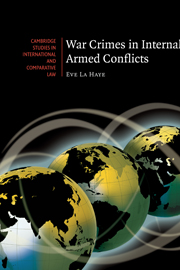Book contents
- Frontmatter
- Contents
- Acknowledgements
- List of abbreviations and acronyms
- Introduction
- 1 Towards a workable definition of internal armed conflicts
- 2 The laws of war applicable in internal armed conflicts
- 3 The regime of war crimes
- 4 Individual criminal responsibility for war crimes committed in internal armed conflicts
- 5 National prosecutions of war criminals and internal armed conflicts
- 6 International prosecutions of war criminals and internal armed conflicts
- Concluding remarks
- Select bibliography
- Index
5 - National prosecutions of war criminals and internal armed conflicts
Published online by Cambridge University Press: 27 July 2009
- Frontmatter
- Contents
- Acknowledgements
- List of abbreviations and acronyms
- Introduction
- 1 Towards a workable definition of internal armed conflicts
- 2 The laws of war applicable in internal armed conflicts
- 3 The regime of war crimes
- 4 Individual criminal responsibility for war crimes committed in internal armed conflicts
- 5 National prosecutions of war criminals and internal armed conflicts
- 6 International prosecutions of war criminals and internal armed conflicts
- Concluding remarks
- Select bibliography
- Index
Summary
Impunity of war criminals especially in internal armed conflicts has generally been the rule. It has often been recognised that impunity acts as a major encouragement to future offenders. It is submitted that the recognition that such conduct amounts to war crimes entailing individual criminal responsibility in internal armed conflict will strengthen the fight against impunity. Such recognition opens new avenues, as international tribunals as well as domestic courts could prosecute these international crimes. Responsibility for war crimes committed in internal armed conflicts can be enforced by three distinct but not mutually exclusive jurisdictions. Perpetrators could be prosecuted by the courts of the state on whose territory the offences were committed, the state of nationality of the victims or by the state of their own nationality. In internal armed conflicts, these three possible states will most of the time be one and the same, i.e. the territorial state. The national courts of the territorial state seem best placed to bring perpetrators to justice: they have direct access to witnesses as well as evidence, and their judgments carry a symbolic effect: the victims can see justice being done and this can act as a deterrent to future criminals. However, governments do not often pursue this solution, as those in power might protect suspected criminals, be the perpetrators of war crimes themselves or vote amnesty laws. Even if willing to prosecute, governments may lack the financial, technical or human resources to carry out the prosecutions.
- Type
- Chapter
- Information
- War Crimes in Internal Armed Conflicts , pp. 216 - 316Publisher: Cambridge University PressPrint publication year: 2008



